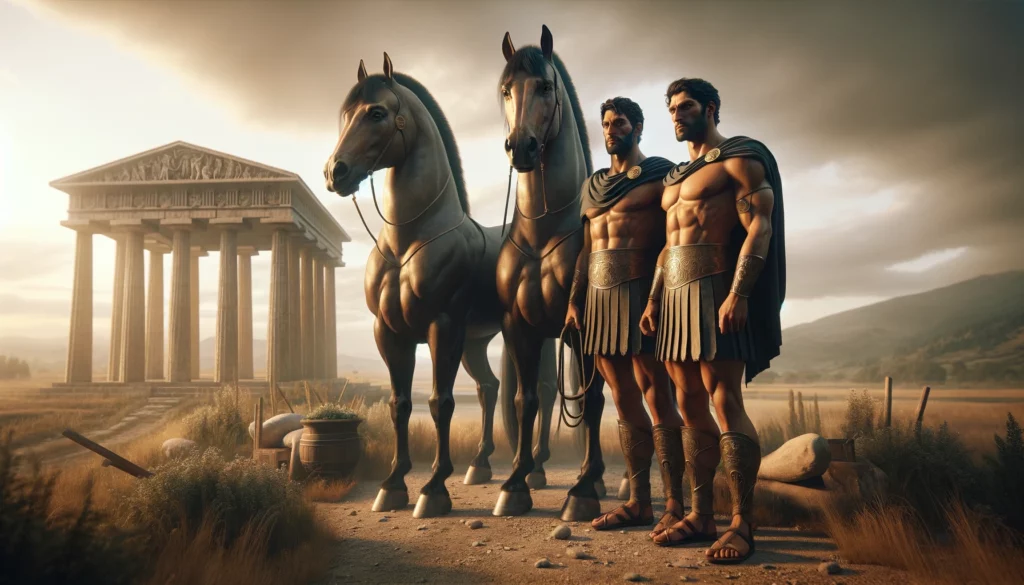Pollux, also known as Polydeuces in Greek mythology, was one half of Dioscuri with his twin brother Castor. His mother was the princess Leda, whom he shared with Castor. Pollux and Castor had different fathers, though.
Castor was the son of King Tyndareus of Sparta, Leda’s husband. Pollux, though, was the son of Zeus, who disguised himself as a swan in order to seduce Leda, making Pollux a demigod, unlike his human brother. In some versions of the myth, the brothers are both mortal. Other versions of the myth suggest Pollux and his twin brother were hatched from an egg. Much like their sisters Helen and Clymenestra. In some images, the twins are shown wearing skull caps. These are thought the symbolize the egg shells from which they hatched.

Pollux In Mythology
In most Greek mythology, Pollux features alongside his brother. Pollux and Castor fought alongside Jason in his search for the Golden Fleece. They also helped Jason to bring down the city of Ioclus to punish King Pelias for his treason. The brothers helped to hunt the Calydonian Boar.
When Theseus, the king of Attica, kidnapped their sister Helen, the brothers rescued her and kidnapped Theseus’s mother, forcing her to become Helen’s slave as an act of revenge.
Pollux and Castor fell in love with a set of sisters who were already involved with their cousins. The twins kidnapped the girls and returned to Sparta, which caused problems within the family. The cousins retaliated by stealing some of the family’s cattle.
When Pollux and Castor followed to get their cattle back, they took their sister Helen with them. Helen met Paris, they fell in love and sparked off the Trojan War. Pollux and Castor’s cousins discovered they were trying to steal the cattle back. Castor was wounded and killed while Pollux was saved when his father, Zeus, threw a thunderbolt at the cousin trying to kill Pollux.
Pollux was heartbroken without his brother. As a demigod, he was immortal, but he begged his father to give half of his immortality to Castor.
Zeus granted the request and the twins were turned into the constellation known as Gemini, one of the major constellations of astrology. As the Gemini, they were able to move between Olympus, the home of the gods and goddesses, and Hades, the underworld.
Gods of Sailing and Horsmanship
In mythology, Pollux and his brother Castor were the gods of sailing and horsemanship. The brothers would appear to sailors in the form of St. Elmo’s Fire, which is an electrical discharge that resembles fire and could sometimes be seen on the mast of a ship before or after a storm. The brothers were the gods of horsemanship because they were sometimes seen riding the ocean waves as one would ride a horse. Pollux and Castor were also known for their boxing abilities, and were thus the gods of athletes and athletic competitions.
In Art and Literature
In both art and literature, Pollux and his brother were shown with horses, as the two were famed horsemen. They were also often shown with various symbols of twinhood, such as wood put together at crossbeams, two vases, two shields or two snakes.
Both the Greeks and the Romans worshipped Pollux and Castor. They were particularly popular in Sparta, where they were said to be born. The Spartans even had a tradition of having two princes in honor of the brothers.
The Dioscuri were also favored in Rome, where there was a temple built to the twins. In fact, the twins were so favored by the Greeks and the Romans that they were often invited into their homes as people would lay out tables of food for them.
Facts About Pollux
- The constellation Gemini, repress Pollux and his brother Castor. It is both symbolic of their mythological journey and also plays a crucial role in astronomy.
- Pollux’s willingness to share his immortality with Castor is a profound symbol of brotherly love and sacrifice. Highlighting the deep bonds of family and loyalty in Greek mythology.
- Beyond their divine protection over sailors and horsemanship, the Dioscuri’s expertise in boxing made them patrons of athletes too.
- The Dioscuri were celebrated not just in mythology but in the real world, with their worship particularly strong in Sparta and Rome. Here, they were seen as protectors of the state and exemplars of martial and moral virtues.
- The appearance of St. Elmo’s Fire, associated with Pollux and Castor, was considered a good omen by sailors.
Link/cite this page
If you use any of the content on this page in your own work, please use the code below to cite this page as the source of the content.
Link will appear as Pollux: https://greekgodsandgoddesses.net - Greek Gods & Goddesses, June 11, 2018